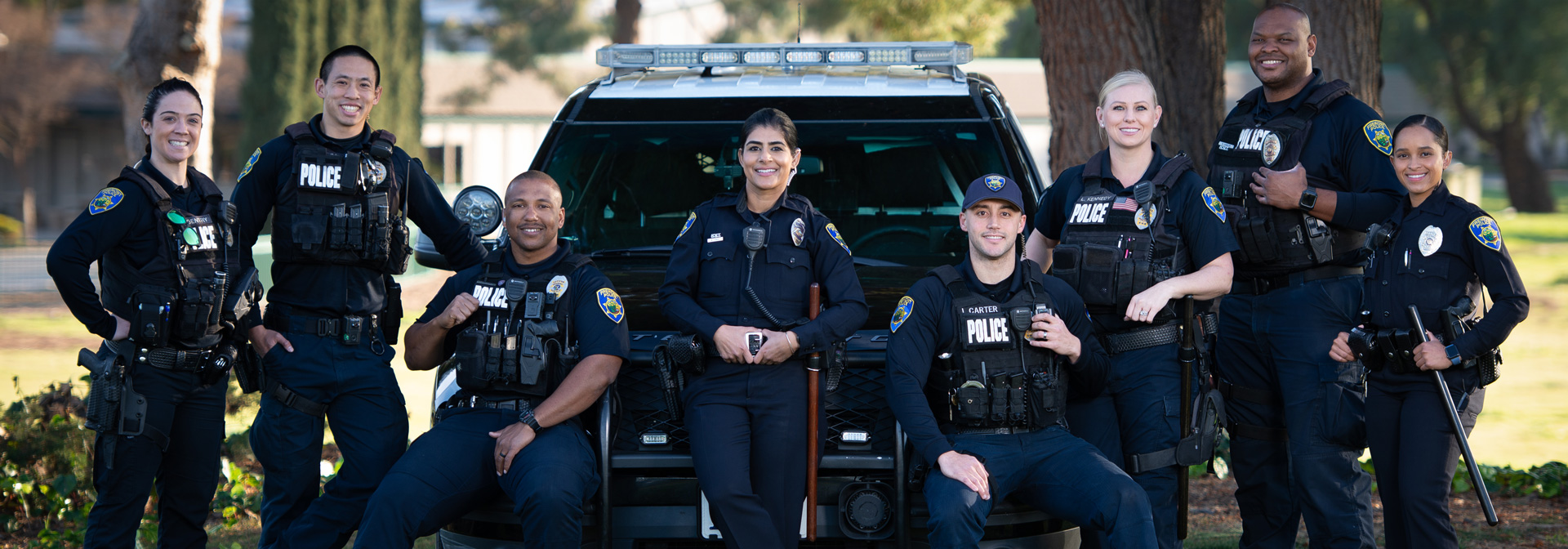When it was announced that Sean Washington would become the next Police Chief of the Fremont Police Department, he received a flood of congratulatory messages, but one stood out — a random phone call from a resident who Chief Washington had met on a service call decades ago when he was first starting out with FPD.
The woman thanked him for helping her and her son through a difficult time, expressed her appreciation for changing their lives, and congratulated Chief Washington on his appointment. Chief Washington did not remember the interaction which occurred over 20 years ago; however, the call exemplified the reason he and others went into policing — to make a difference and help people.
Chief Washington never imagined or aspired to become Chief of the Fremont Police Department. When he joined the Police Department, he aimed to help others, make the community safer, and potentially save lives. However, he fell in love with Fremont, its community, and the Department, and grew passionate about making policing and the FPD better, which naturally brought him to positions of leadership and ultimately lead to his appointment as Chief.
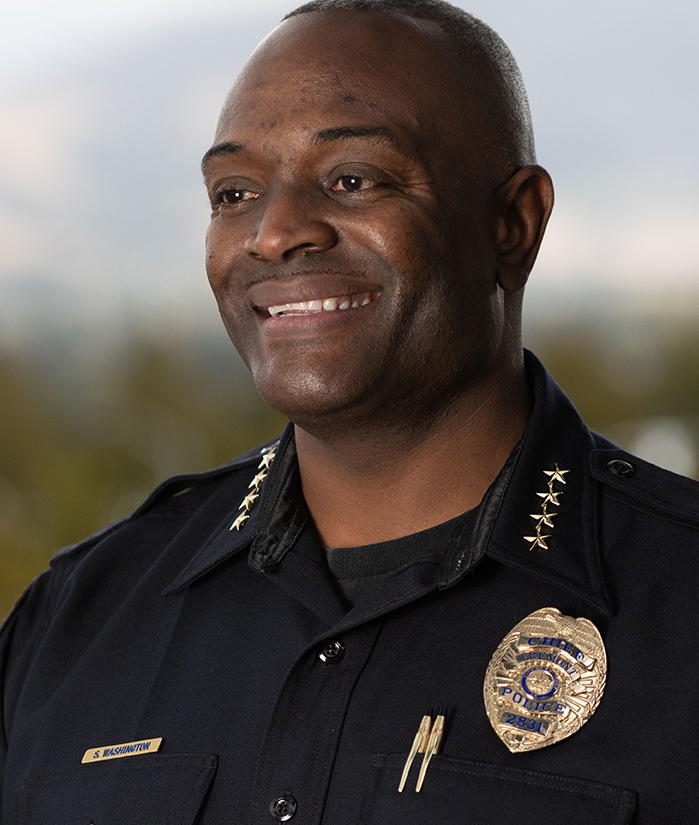
His story is an example of how understanding your purpose, listening, teamwork, and community collaboration can take you far in the Fremont Police Department.
Read on to hear his story, vision for the Department, and how you just might fit into that picture.
Q:Chief Washington, what sparked your interest in law enforcement?
I’ve always been around law enforcement. My father actually worked for the Los Angeles Sheriff’s Department for 31 years, working as a Police Officer during the Rodney King riots in 1992. He exhibited an inspiring level of professionalism and fairness during that difficult time, which made me want to pursue policing as my career.
Q: That must have been challenging. What was it like to have your father in the LASD while the riots were happening?
I was a teenager, so I was really concerned, especially for my father’s safety. I didn’t fully understand the situation or the complexity of what the community was going through at the time. Looking back at how my father dealt with this experience, I learned that it’s a Police Officer’s duty to listen and not dismiss the frustrations of the community and that you can do this while also standing up for the dignity of Police Officers and the law enforcement profession.
Q: Sounds like there’s a real balance that Police Officers must find between the community and the profession. How have you found that balance?
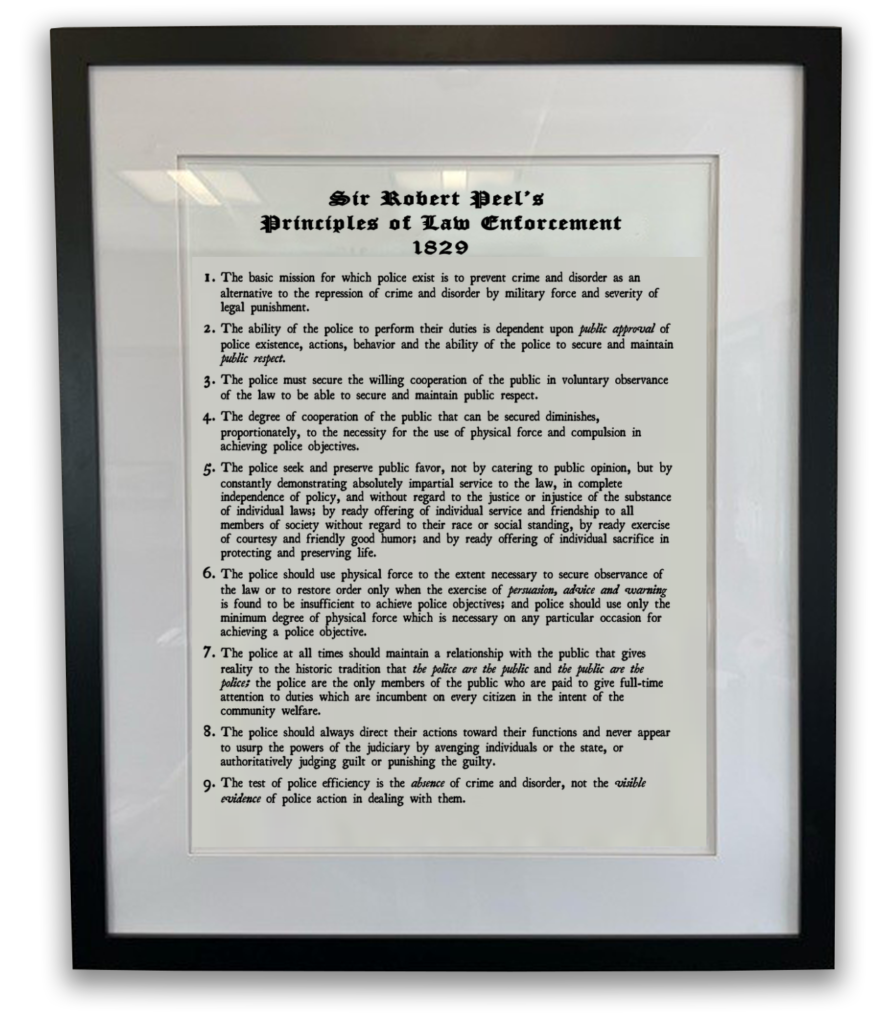 Exactly. One of my favorite philosophies is from Sir Robert Peel, “The ability of police to perform their duties is dependent upon public approval of police existence, actions, behavior and the ability of the police to secure and maintain public respect.” I’ve hung this phrase, along with others, on the wall of my office, and I remind every Officer who talks to me that it’s a partnership between all of us, the Officers and our residents, to keep our community safe.
Exactly. One of my favorite philosophies is from Sir Robert Peel, “The ability of police to perform their duties is dependent upon public approval of police existence, actions, behavior and the ability of the police to secure and maintain public respect.” I’ve hung this phrase, along with others, on the wall of my office, and I remind every Officer who talks to me that it’s a partnership between all of us, the Officers and our residents, to keep our community safe.
Q: You’ve been with the FPD for over two decades now. How has the Department evolved over your time here?
We are in the midst of a significant change and evolvement of law enforcement right now. Our community is at the forefront of how we police, and while we have obvious advances in the technology and equipment we use, as well as the training every Police Officer receives, there is an increased level of professionalism throughout the Department tied to the higher quality of individuals we are recruiting. We are fortunate to have a long tradition of excellence and progressiveness. Utilizing the foundation of our past, I am confident we will continue to make whatever adjustments are needed meet the community’s evolving expectations in the future.
Q: Obviously being a Police Officer is not an easy profession. How does the Department work to foster a healthy, supportive environment?
With Fremont, you really are part of a family. My father passed away in 2017, and it devastated my family. I had no expectations of anything from the Department; however, four to six traffic officers and command staff drove all the way to the Valley in full uniform to pay their respects. They even spontaneously provided an escort of my Dad’s coffin to the burial site. This is an example of the support we have for each other within the Department.
Q: Wow. I know your father was your hero. That must have meant a lot to you.
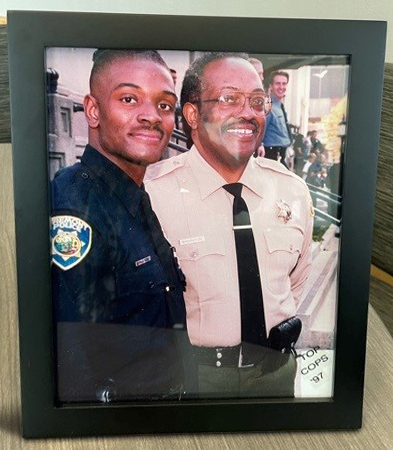 It meant everything to me. It was a perfect example of my secondary family in Fremont supporting my biological family. And things like this happen all the time at FPD. Our Department really cares and wants to support our Officers in all aspects of life emotionally, physically, mentally, and, of course, professionally.
It meant everything to me. It was a perfect example of my secondary family in Fremont supporting my biological family. And things like this happen all the time at FPD. Our Department really cares and wants to support our Officers in all aspects of life emotionally, physically, mentally, and, of course, professionally.
Q: Why do you think it’s important that the Department invest in professional development opportunities for officers?
We’re all human, and so, we as a Department must work to ensure that our Officers feel supported in every element of their lives. Whether it’s helping to establish healthy eating habits or navigating issues at home, we know that the more assistance our Officers have, the better off they are and the better services they can provide to the Fremont community.
Q: How does camaraderie among Officers help to foster this supportive environment?
Our group works well together as a team. But beyond that, our group chooses to be with each other, whether on duty or off duty. We often come together for celebrations, events, and sports. We spend so much time at the PD, away from our families, so it is critical we have support here at work as well. I also encourage team building activities whenever we can. Playing sports for most of my life, I recognize the value to strengthening relationships which ultimately produces better outcomes.
Q: Like the annual basketball game against the Fremont Fire Department?
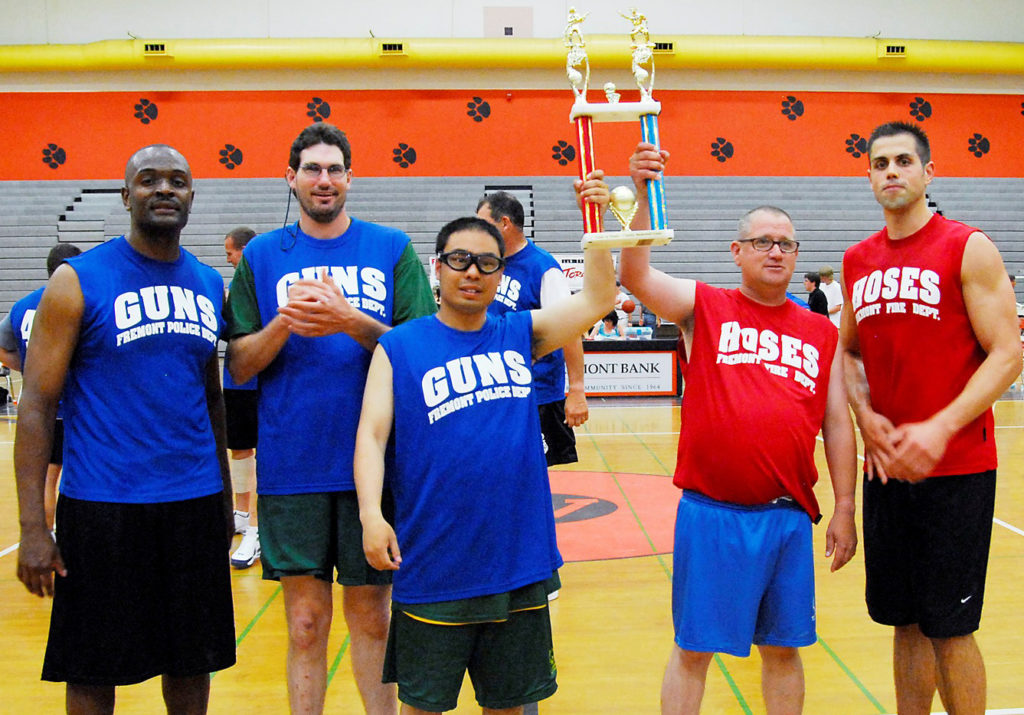
That’s right. My role is to ensure that we will never lose to Fire, whether that’s playing in the game or coaching. There may even be a video on YouTube of me hitting the game-winning shot against them in the last few seconds of the 2010 game. While I am now retired (thanks to multiple basketball-related injuries), I now pride myself on being the master recruiter of young talented FPD officers, but if it’s necessary, I will come out of retirement to make sure we get the job done. Don’t get me wrong, I love our partners at the Fire Department, I just can’t stomach losing to them in friendly competition.
Q: It seems like the Department has a really strong sense of culture. How does diversity and inclusion play into it?
It’s extremely important. As Chief, when you have a diverse workforce, you can make better decisions because you’re aware of different perspectives and concerns that you may not have known otherwise. This spirals out into the types of decisions our Officers are making while on shift.
Q:How will you continue to help underrepresented voices and perspectives be heard?
Over the last few years, I’ve been contacted by many community members requesting someone familiar with their culture because they felt their perspective would be better understood. Although it would be unreasonable to have an Officer representing every culture or belief, my overall goal is to have community members feel comfortable and have an opportunity to talk to an Officer who intellectually and emotionally represents them in our Department. This highlights the need to ensure we provide experience, education, and discussion in the form of cultural awareness training for our staff. Although we may not have every culture or belief represented in our workforce, we can certainly ensure we are exposed to diverse populations within our community.
Q: With that in mind, do you have any plans in place to grow FPD’s diversity and inclusion initiatives?
In the coming weeks I plan to sign the 30 x 30 initiative that aims to increase the representation of women in police recruit classes to 30% by 2030, but this is just the beginning. I’d say FPD does a great job at being inclusive and welcoming, but as Chief, it’s my goal to help new candidates feel comfortable enough to be themselves without fear of being judged. As we do with our community, we value different beliefs and understand that diversity is our strength.
.
Q: Any recent intelligence-led policing examples come to mind?
Right now, thefts of catalytic converters are off the charts. Utilizing intelligence-led policing, we were recently able to identify a person responsible for multiple catalytic converter thefts. This crime will continue to be challenging as it is a regional issue, however intelligence-led policing will be our primary approach to mitigate the impacts on our community. With intelligence-led policing, we put resources towards identifying who is responsible for these crimes. This allows us to avoid casting a big net for potential offenders and eliminates potential biases by using data and information to identify the people that are causing the most harm to our community.
Q: Aside from continuing intelligence-led policing, what other priorities do you have as Chief?
My priorities are really a cumulation of the community conversations I have had with the FPD team, Fremont businesses and residents. And while I want to do a lot, the six goals I have prioritized are to build relationships, trust, and police legitimacy, increase organizational efficiency, conduct comprehensive reviews of policies and procedures, invest in staffing and professional development, identify additional employee wellness programs, and build partnerships that help achieve our overall City initiatives.
Q: Tell me more about the specific training programs available for Officers. What can Officers expect as they start their career at FPD and move up the ranks?
We want our Officers to be the best version of themselves they can be, so we develop training plans for all employees that include both internal FPD specific trainings as well as training from reputable third parties. We encourage all management staff to attend Command College, FBI Academy, Supervisory Leadership Institute (S.L.I.), and other professional development opportunities. As part of this program, we have a partnership with Ohlone College to develop a degree program for all employees and ranks. We also have diversity trainings, cultural awareness workshops, and leadership opportunities for our Officers. Bottom line, we want to invest in our Officers as individuals and professionals. Training has been a commitment for our Department for decades, and we have not wavered in providing as much as we can.
Q:Lastly, what would you tell someone who is thinking of pursuing a job with FPD?
I would tell them the same thing that my Dad told me. I would ask them to think critically that they are doing it for the right reasons — not to have power or to follow in someone else’s footsteps — but because they feel passionately about protecting and respecting the community. If you do that, you will succeed with FPD. Being a Police Officer is more than just a job, it is a calling to serve. It requires sacrifice, teamwork, and dedication. Law enforcement is the most honorable profession on the planet, and if you truly believe in the vision and mission of FPD, I encourage you to come join the best Police Department around. Be a part of something special and join our team.

